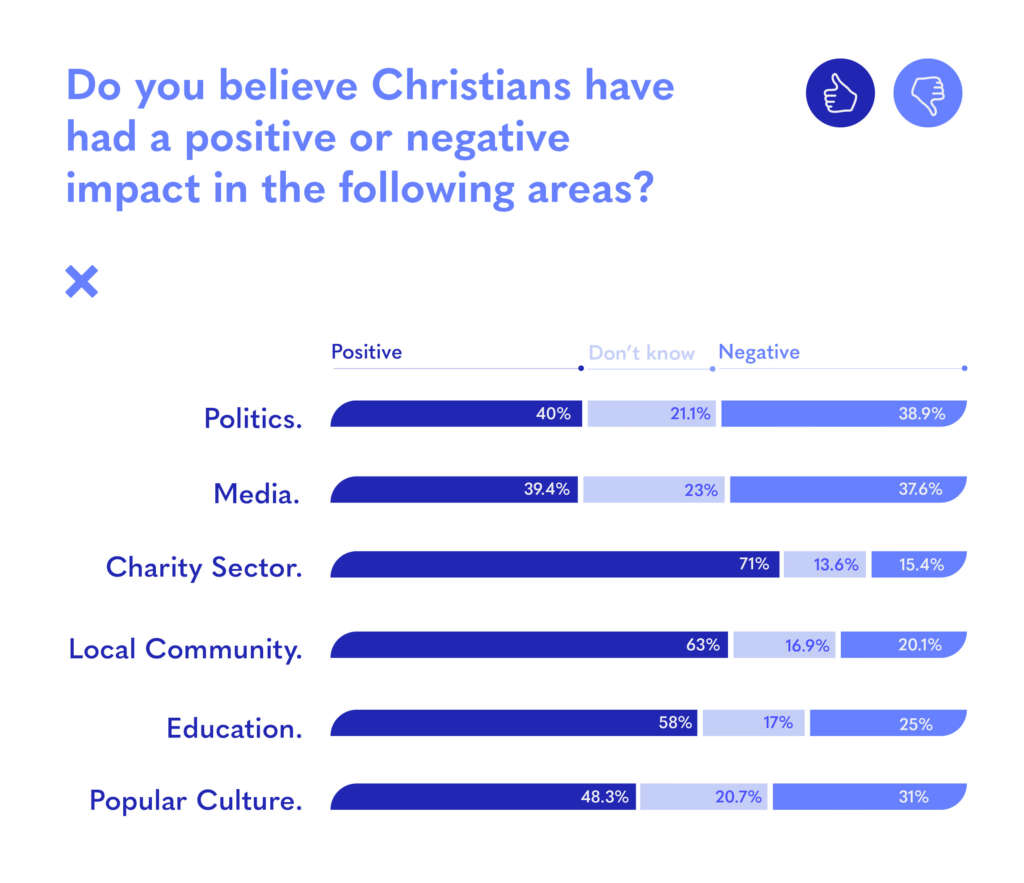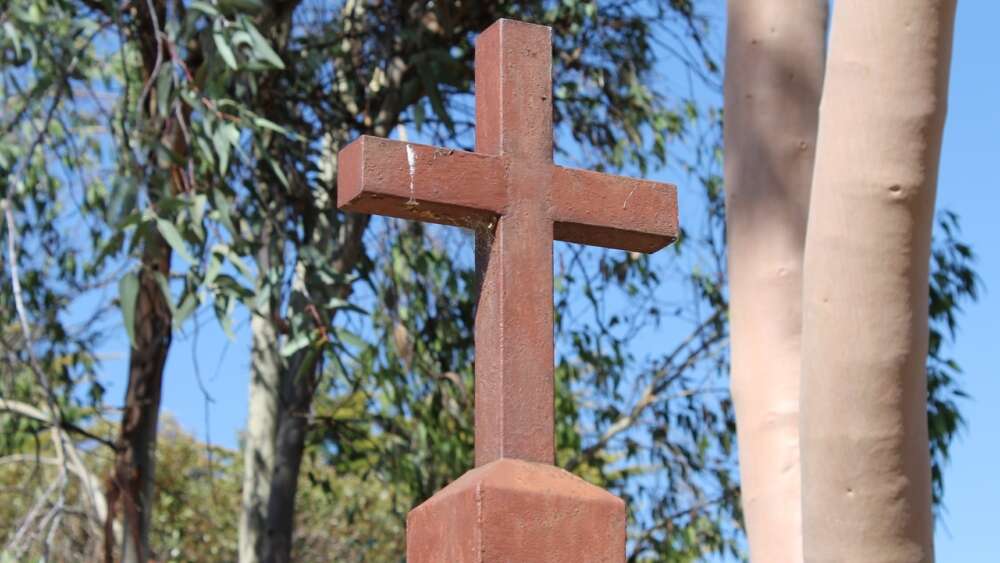“There is only one thing in life worse than being talked about,” quipped Oscar Wilde, “and that is not being talked about.”
Many people will tell you that Christianity has a reputation problem, and certainly there’s been no shortage of hits to the global “brand” in recent years.
With more than two billion people claiming some kind of affiliation with the world’s largest religion, it makes sense that there’s an awful lot of data – good and bad – for people to draw on when assessing what they think Christians are like, and what they’ve done or failed to do.
Plenty of the data is complicated, too, or even contradictory. In 2017, an Ipsos poll conducted across 23 countries found that 49 per cent of adults think that religion does more harm than good in the world.
Here in Australia, it was quite a bit higher: 63 per cent of Aussies agreed that overall, we’d be better off without religion.
That’s a little surprising, given 60 per cent of the population ticked a religious affiliation box in the 2016 census. A survey – recently commissioned with McCrindle Research, by the Centre for Public Christianity (CPX) – also suggested that things are not so black and white.
We asked Australians whether they believed in the supernatural (miracles, ghosts, angels, God, the soul, etc) and also what they make of the claim that Jesus Christ rose from the dead. (You can read about those results here, as well as the storm in a teacup they stirred up here.)
After that, we asked: Do you believe Christians have had a positive or negative impact in the following areas? Respondents could opt for “very positive”, “somewhat positive”, “somewhat negative”, “very negative”, or “I don’t know” in areas including politics, media, the charity sector, the local community, education, and popular culture.

Perhaps unexpectedly, there was no category in which the negative outweighed the positive. Politics came close (40 per cent very/somewhat positive, 38.9 per cent very/somewhat negative), as did media (39.4 per cent very/somewhat positive, 37.6 per cent very/somewhat negative). Charity, unsurprisingly, came out overwhelmingly positive: 71 per cent, with only 15.4 per cent selecting very or somewhat negative, and 13.6 per cent saying they didn’t know.
These were not disproportionately churchy people, either. Of the 1,000 respondents, 46.6 per cent identified with some form of Christianity (lower than the 52.1 per cent in the 2016 census). The “nones” were 30.1 per cent of the cohort, and another 13.9 per cent ticked “I have spiritual beliefs but I don’t identify with any main religion”. This represents a reasonable cross-section of both secular and religious Australians.
A few observations, then – and a little speculation – about what lies behind those numbers.
Politics vs Charity
At opposite ends of the spectrum were politics and charity. Anybody shocked? Of course, this tracks with general levels of trust in different sectors: despite a significant bump in Australians’ trust in government across 2020, distrust of politicians is proverbial. Despite many charitable institutions being embroiled in abuse scandals, there remains a deep current of respect for the kinds of work done by the Salvation Army, Anglicare, Baptist World Aid, Compassion, World Vision, and innumerable others.
Both politics and charity present arenas for serving the common good at scale. But while suspicions of self-interest cling persistently to those in public service (fairly or unfairly as the case may be), it is much easier for the general public to believe that charity workers are genuinely in it for the good of others. The heavy involvement of Christian organisations in service provision in Australia is a more or less textbook illustration of what it means to do good deeds which win over the watching world, even though “they accuse you of doing wrong” (1 Peter 2:12).
… Many parents with no connection to religion will quite happily entrust their children to the formation on offer from overtly Christian schools.
Education
58 per cent of Australians think the impact of Christians on education has been a good thing: 17.8 per cent rate it as “very positive” and 40.2 per cent as “somewhat positive”.
Of the four million-odd students enrolled in schools across Australia, one third are in non-government schools. The overwhelming majority of which (in 2010, it was more than 90 per cent) are in religious schools.
It’s an interesting anomaly that, in a nation that thinks of itself as staunchly secular in many respects, many parents with no connection to religion will quite happily entrust their children to the formation on offer from overtly Christian schools.
There are historical and cultural reasons for this; but also, that sometimes nebulous thing called “ethos” is important here. There are few areas where Christians will be making a deeper or more lasting impact on Australian life over the next several decades than in what happens within these school communities.
The church visible and invisible
When asked about the impact of Christians on media, survey participants gave it their lowest rate of approval: only 39.4 per cent thought Christian influence was very or somewhat positive.
A possible counterpoint to that is the “local community” option, which had the highest positivity after charity, at 63 per cent. The often gladiatorial realm of media might leave a bad taste in people’s mouths (and, surely, we all have opportunities to inject more grace and neutralise more of the vitriol in our public discourse). But as social researcher Hugh Mackay reported in his book Beyond Belief, 88 per cent of non-churchgoers in Australia believe the presence of a church is good for a local community.
The culture is different because we are here.
In the flesh, in concrete presence and acts of service and invitation, the good that many churches do is visible to many people. There are things people long for that are difficult to find elsewhere.
Amid an epidemic of loneliness, healthy Christian communities offer connection; in a culture permeated by an unacknowledged fear of death, they hold out resurrection hope. And I love the way that the American writer Marilynne Robinson talks about the phenomenon of the sermon, as “the extraordinary moment when someone attempts to speak in good faith, about something that matters, to people who attempt to listen in good faith”. There are lots of contexts, from universities to TED talks, where people seek to communicate truth to one another:
But to speak in one’s own person and voice to others who listen from the thick of their endlessly various situations, about what truly are or ought to be matters of life and death, this is a singular thing. For this we come to church.
Sow wisely and well
Within a cultural climate increasingly het up by talk of culture wars, an alternative way of thinking about Christian engagement with the world comes from the Japanese-American artist Makoto Fujimura, who advocates the idea of “culture care”:
Culture is not a territory to be won or lost but a resource we are called to steward with care. Culture is a garden to be cultivated.
In education and the media, in welfare and politics, in the local communities in which each of us is embedded, Christians are having an impact on Australian life, for better and/or for worse. The culture is different because we are here.
If the only thing worse than being talked about is not being talked about, the debates which periodically rage about Christian influence on our culture may be a good sign – and a reminder to sow wisely and well in whatever patches of ground we occupy.
Natasha Moore is a Research Fellow at the Centre for Public Christianity.




